MercoPress. South Atlantic News Agency
Tag: Parana River
-
Thursday, June 24th 2021 - 07:50 UTC
Paraguay passes emergency bill as downspouts hinder river navigation
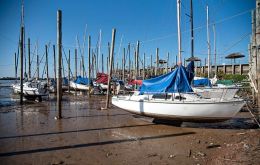
Paraguay's Lower House Wednesday passed an emergency bill on river navigation and authorized dredging works at the Paraguay, Paraná and Apa rivers as downspouts prevent normal navigation. The document now goes to the Executive Branch for consideration.
-
Wednesday, November 25th 2020 - 09:30 UTC
China competes in the dredging of Paraguay/Parana Waterway which handles 90 million tons of grains

A Chinese company entered the competition to manage a section of the Paraguay-Paraná Waterway, joining four European companies seeking to win the concession to deepen the draft and provide maintenance on approximately 1,238 kilometers of the river course beginning in 2021.
-
Monday, October 26th 2020 - 09:50 UTC
Drought and wildfires devastating South America's wetlands and forests
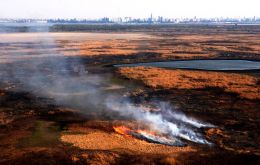
Experts say the wildfires in a region that spans Argentina, Brazil, Bolivia, and Paraguay – especially the region between the Paraguay, Parana, and Uruguay rivers – have become critical in 2020.
-
Wednesday, August 5th 2020 - 07:48 UTC
Itaipú dam generates more power to help Paraguayan barges with soybeans reach the River Plate

Just over two months after completing a special outflow to increase the level of the drought-stricken Paraná River, the world largest operational hydroelectric dam, Itaipu, located on the border of Brazil with Paraguay, will increase energy production to help sailing along the huge South American water artery.
-
Wednesday, July 22nd 2020 - 08:00 UTC
Parana river insufficient water level benefitted exports from Brazilian ports

Due to the Paraná river drought, which affected Argentina’s soy oil-exporting capacity, Cattalini Terminais Marítimos, which handles almost 70% of Brazil’s soy oil exports through its facilities in the port of Paranaguá, predicts a 25% increase in shipments this year.
-
Friday, May 15th 2020 - 08:49 UTC
Next Monday Itaipu opens its spillway to help lift the drought stricken Parana river level
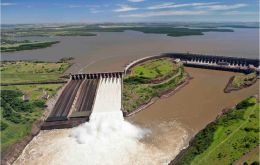
The world's largest operational hydroelectric dam, Itaipu Plant announced that starting next Monday, May 18, it will open its spillway to help Paraguay and Argentina, which are suffering from a drought and hence having problems transporting their grain harvest.
-
Saturday, April 18th 2020 - 19:56 UTC
Argentina and Brazil trying to lift the water level of the Parana River, in the heartland of the soy belt
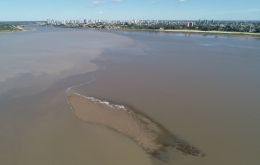
The governments of Argentina and Brazil are in talks to release water from the giant Itaipu Dam with a view to topping up the Parana River, where ebbing levels are conspiring against a US$ 20-billion-a-year crop export business.
-
Tuesday, April 14th 2020 - 08:45 UTC
Parana river water level hampering grain transport in the midst of peak harvest
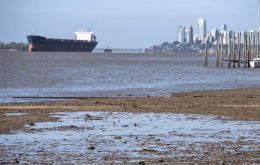
Below normal rains in the Parana-Paraguay water basin is hampering grain transport through waterways in Argentina as the water level of the river has dropped significantly, Bolsa de Comercio de Rosario, or BCR, said in a report.
-
Thursday, August 9th 2018 - 07:13 UTC
Parana River low water level increasing freight costs for cereal transport

Large grain transport ships using Argentine’s port hub of Rosario have had to reduce their cargo by between 3,200 and 4,300 tons because of an unusually low water level in the Parana River, the Rosario grains exchange said this week.
-
Monday, May 7th 2018 - 08:42 UTC
Argentina Parana River returns to normal activity following release of grounded vessel

Grains shipping on Argentina’s Parana River was returning to normal on Saturday after a ship ran aground on Friday, causing delays, the head of Argentina’s Chamber of Port and Maritime Activity said.
